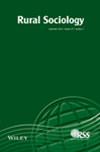单身母亲如何评估和应对农村生活?社会劣势与空间劣势的相互作用
IF 1.9
3区 社会学
Q2 SOCIOLOGY
引用次数: 0
摘要
当社会劣势和空间劣势相遇时,它们会加倍吗?实证研究令人信服地表明,不利因素往往会累积。我们的论文通过关注以劳动力市场疲软和可及性问题为特征的农村边缘地区单身母亲的社会地位、主观观点和代理问题来推进这一学术研究。根据在德国东部和捷克进行的以问题为中心的访谈,我们调查了单身母亲如何看待和评估当地和区域的机会。此外,我们采用应对的概念来分析它们如何应对空间限制。我们的研究结果表明,虽然我们的受访者遇到了各种空间限制,有些人觉得自己陷入了不断积累的劣势循环中,但他们往往认为这些限制与他们生活环境的优势相平衡或超过了这些限制。我们的深入分析确定了应对空间劣势的回旋余地,并阐明了与不同应对策略相关的成本和风险。综上所述,我们认为,将能动性和主观性的观点纳入不平等研究中,可以细致入微地理解社会和空间劣势之间的相互关系。本文章由计算机程序翻译,如有差异,请以英文原文为准。
How Do Single Mothers Evaluate and Cope with Living in Rural Peripheries? Insights into the Interplay of Social and Spatial Disadvantage*
When social and spatial disadvantages meet, are they doubled? Empirical studies have convincingly demonstrated that disadvantages tend to accumulate. Our paper advances this scholarship by focusing on the under‐researched issue of social positions, subjective perspectives, and agency among single mothers in rural peripheries characterized by weak labor markets and accessibility issues. Drawing from problem‐centered interviews conducted in eastern Germany and Czechia, we investigate how single mothers perceive and evaluate the local and regional opportunities available to them. Additionally, we employ the concept of coping to analyze how they navigate spatial constraints. Our findings reveal that while our respondents encounter various spatial limitations and some feel ensnared in cycles of accumulating disadvantages, they often view these constraints as balanced or outweighed by the advantages of their living environment. Our in‐depth analysis identifies room to maneuver in coping with spatial disadvantages and sheds light on the costs and risks associated with different coping strategies. In conclusion, we argue that incorporating a perspective on agency and subjectivity into research on inequalities allows for a nuanced understanding of the interrelation of social and spatial disadvantages.
求助全文
通过发布文献求助,成功后即可免费获取论文全文。
去求助
来源期刊

RURAL SOCIOLOGY
SOCIOLOGY-
CiteScore
4.60
自引率
13.00%
发文量
47
期刊介绍:
A forum for cutting-edge research, Rural Sociology explores sociological and interdisciplinary approaches to emerging social issues and new approaches to recurring social issues affecting rural people and places. The journal is particularly interested in advancing sociological theory and welcomes the use of a wide range of social science methodologies. Manuscripts that use a sociological perspective to address the effects of local and global systems on rural people and places, rural community revitalization, rural demographic changes, rural poverty, natural resource allocations, the environment, food and agricultural systems, and related topics from all regions of the world are welcome. Rural Sociology also accepts papers that significantly advance the measurement of key sociological concepts or provide well-documented critical analysis of one or more theories as these measures and analyses are related to rural sociology.
 求助内容:
求助内容: 应助结果提醒方式:
应助结果提醒方式:


